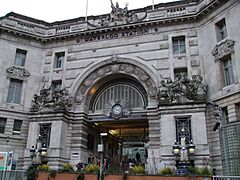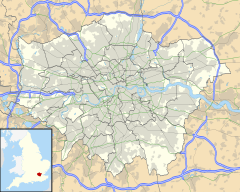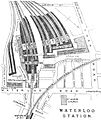Waterloo station facts for kids
| London Waterloo | |

The Victory Arch - the main entrance to Waterloo station
|
|
|
Location of Waterloo in Greater London
|
|
| Location | South Bank |
|---|---|
| Local authority | London Borough of Lambeth |
| Managed by | Network Rail |
| Station code | WAT |
| Number of platforms | 20 |
| National Rail annual entry and exit | |
| 2006–07 | 83.993 million |
| — interchange | 4.227 million |
| 2007–08 | 100.307 million |
| Other information | |
| Lists of stations | |
| Other websites |
|
Waterloo station, also known as 'London Waterloo', is one of the busiest and most important train stations in London. It's a huge place where many train lines end, acting as a major hub for people traveling into and out of the city. The station is owned and managed by Network Rail. You can find it close to the South Bank area in the London Borough of Lambeth. It's also located in Travelcard Zone 1, which is the central part of London's public transport system.
Contents
History of Waterloo Station
Waterloo station has a long and interesting history, going back to the 1840s.
Early Days and Growth
The station first opened its doors in 1848. It was built by the London and South Western Railway company. Back then, it was much smaller than it is today. As more and more people started using trains, the station needed to grow. Over the years, it was expanded many times to handle the increasing number of passengers.
The Victory Arch
One of the most famous parts of Waterloo station is the Victory Arch. This grand entrance was built to remember the brave people who served in World War I. It's a very important landmark and a beautiful piece of architecture. The arch was designed by James Robb Scott.
Modern Changes
Waterloo station has changed a lot over the years. In the early 20th century, it went through a big reconstruction. This included adding special features like a stained glass window with the railway company's crest. More recently, parts of the station were used for international trains, like the Eurostar, which traveled to Europe. These international services moved to St Pancras International in 2007, and those platforms at Waterloo were later brought back into use for regular domestic trains.
What Makes Waterloo Special?
Waterloo is not just a train station; it's a landmark in London.
Busy Platforms
Waterloo is known for having a huge number of platforms. It has 20 platforms, making it one of the largest stations in the UK. This allows many trains to arrive and depart at the same time, helping millions of people travel every year.
Underground Connections
Below the main train station, you'll find a busy London Underground station. This underground station connects to several Tube lines, including the Bakerloo, Northern, and Jubilee lines. This makes it super easy for people to switch from national trains to the Tube and travel all over London.
Location and Surroundings
Waterloo station is in a great spot. It's very close to the South Bank, which is a lively area with lots of attractions. You can find the London Eye, the Southbank Centre, and the National Theatre nearby. This makes Waterloo a popular starting point for tourists exploring London.
Images for kids
-
The Victory Arch, the station's main entrance, was constructed by James Robb Scott and commemorates Britain's involvement in World War I.
-
The early 20th-century reconstruction of Waterloo included a stained glass window with the London and South Western Railway's crest.
-
In this photo taken in 2012, the then-disused Grimshaw-designed shed of the former Waterloo International can be seen nearer to the camera, with the older train shed behind. In the foreground are the Shell Centre (left) and County Hall (right).
See also
 In Spanish: Estación de Waterloo para niños
In Spanish: Estación de Waterloo para niños
 | James Van Der Zee |
 | Alma Thomas |
 | Ellis Wilson |
 | Margaret Taylor-Burroughs |











